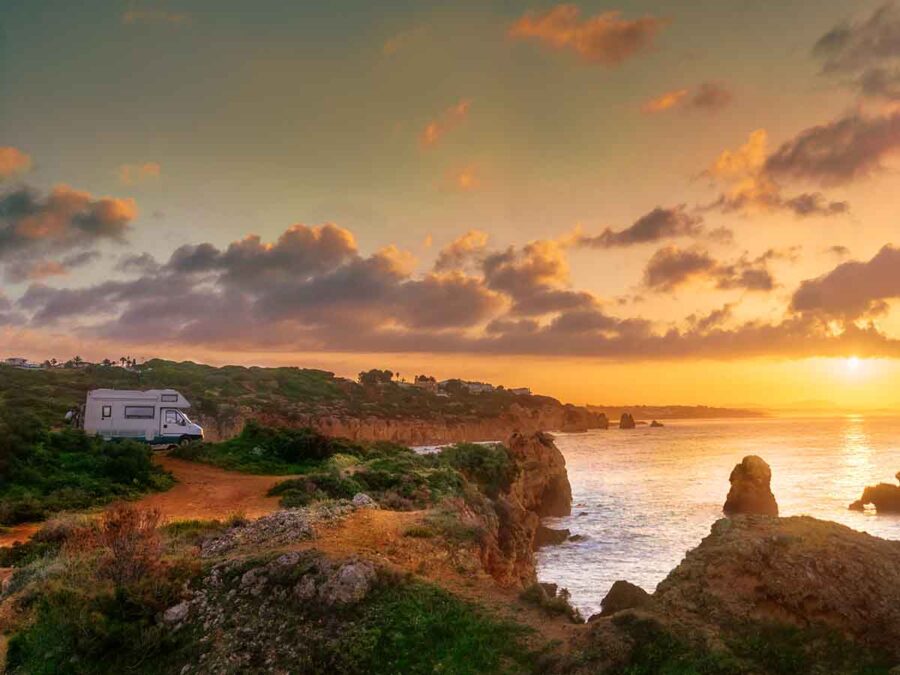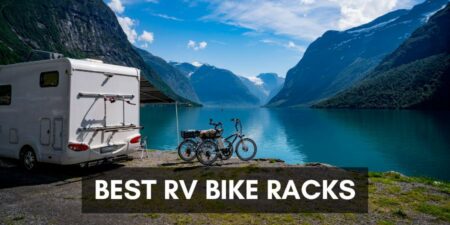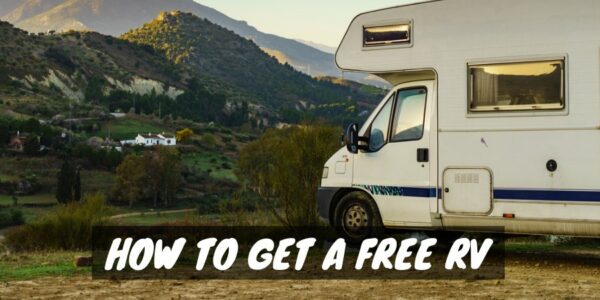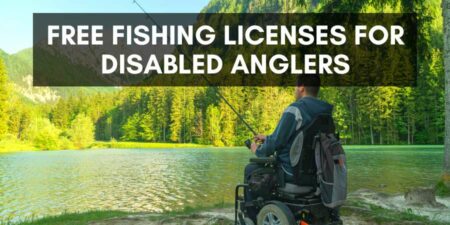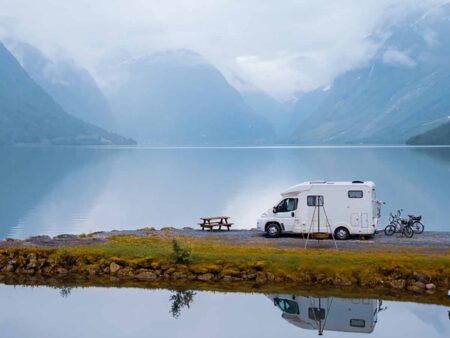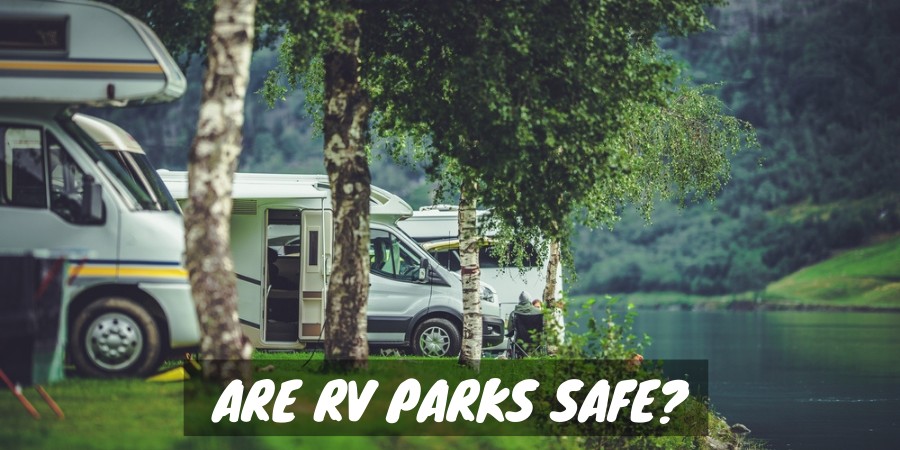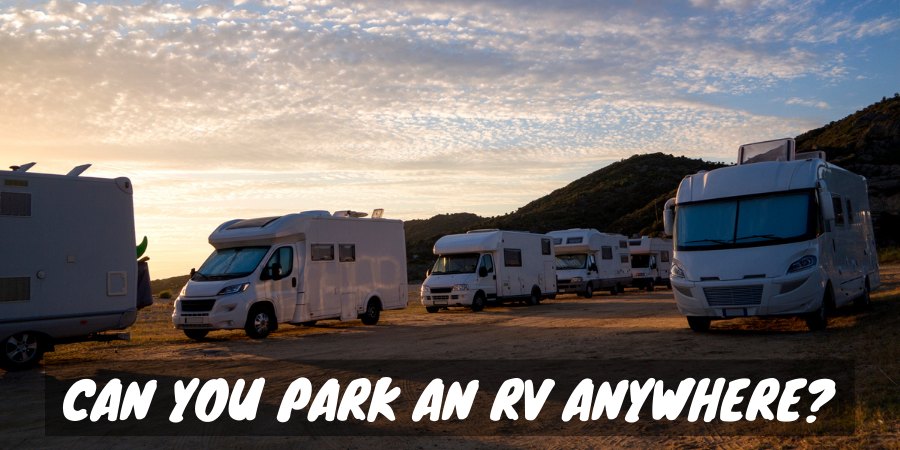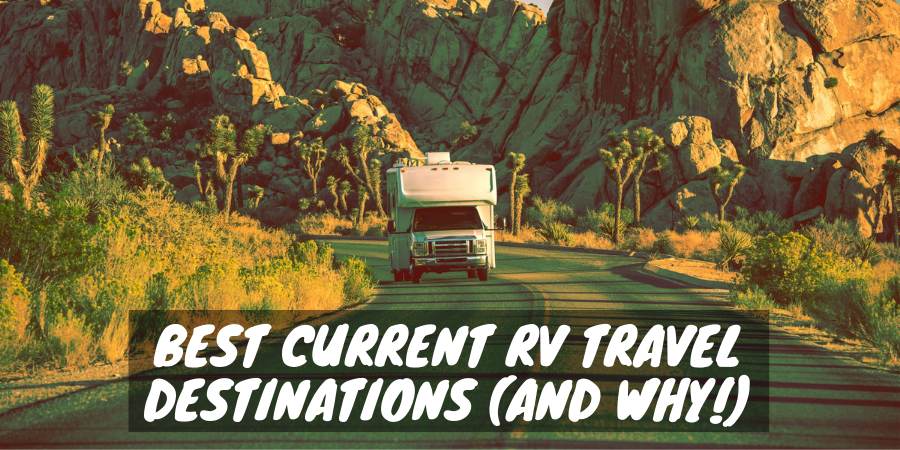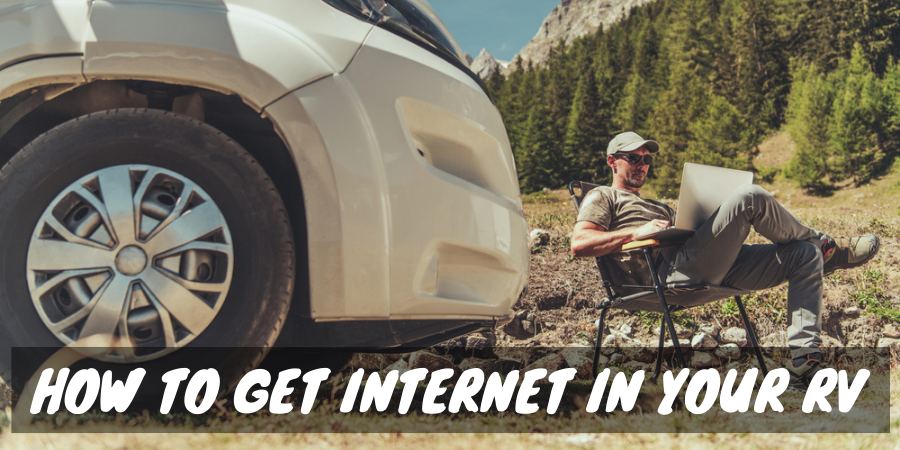Everyone loves something for free, but snagging free campsites for RVers and tent campers is like hitting the lottery! Some camping enthusiasts love the challenge of finding free campsites, while others need to use them to stretch their travel budget.
Either way, you’ll find all the tricks to locating no-pay and cheap camping campsites right here in this ultimate guide to free and cheap camping.
Tent campers and recreational vehicle owners can benefit from the apps, websites, and other sources that provide insider knowledge to locate free camping spots and know what to expect when you arrive.
Call it boondocking, dry camping, dispersed camping, or primitive camping. It all means the same thing – rarely hookups or amenities and very often no charge.
So, follow along as we detail the ins and outs of finding free camping near me across the US!
What You Should Expect at a Free Campsite?
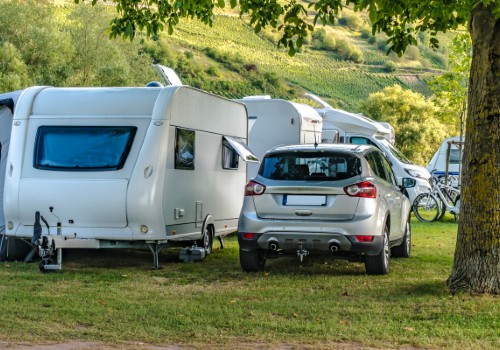
There are some free full-hookup campsites around the US, but most cheap camping sites will be without any electricity, water, sewer, or even bathroom facilities.
Most free campsites are outside developed campgrounds, but let’s look at the different types you’ll encounter.
Different Types of Free / Cheap Camping
Overnight Stays by Retail Stores, Truck Stops, Casinos, or Chain Restaurants
Thousands of commercial properties provide free overnight stays, but these are for RVers or car campers and not for pitching a tent.
The reality of these free stays is that you’re getting a parking/camping spot and possibly access to a restroom, so you can sleep and restock supplies the cheap way versus paying for an official campground campsite.
Expect to park your recreational vehicle in a designated area in the parking lot, often on the far outskirts, away from the high-traffic zones. Expect noise and lights all night from other travelers, but most are relatively safe as police or store security monitor the lot.
Never should you set up chairs outside your camper, run your generator, or open your awning. This location isn’t a campsite. It’s a free place to park, sleep, and move on.
The companies allow RVs to park because it’s beneficial to their business. If the “guests” become too numerous or too problematic, they stop offering the benefit.
Established Dispersed Campsites on Public Land
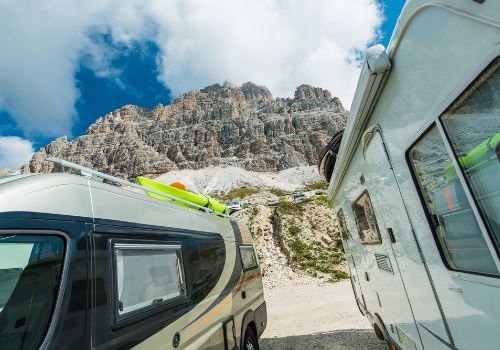
Free camping on public land is often via dispersed campsites.
Boondockers love to google “free dispersed camping near me” and find a place to set up camp for one or two weeks.
Land Management, Fish and Game, and Forestry Bureaus have thousands of acres of undeveloped property they offer for free camping for both tenting and RVs.
Expect most of these campsites to be rough but clearly delineated so you know where to park.
Dispersed camping gives boondockers or off-grid campers a place to enjoy the natural habitat and not be too near other campers, but don’t expect any hookups or amenities at the camping location.
The only reason public land stewards provide dispersed camping is so they can control how many people come into the site and where they are setting up camping equipment or parking RVs. Doing this allows them to protect the natural habitat and local wildlife.
The nightly charges for dispersed camping are free, but some places do require you to pick up or purchase a low-fee permit to enter the area.
Wild Camping Off-Grid on Public or Private Land
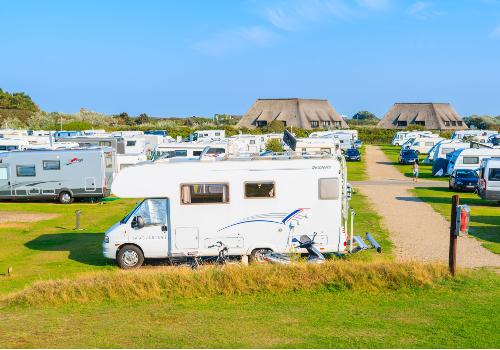
Wild or primitive camping involves more planning but is a cheap way to enjoy free camping far from civilization.
The term hints at what you should expect: narrow dirt roads that lead into the countryside or forests. From there, you go off-road to locate an appropriate campsite.
You can typically camp for free as long as you wish, but your survival depends on your skills and the supplies you pack in.
RVers need to be even more careful embarking on wild or off-grid camping as the size and weight of motorhomes or tow vehicles and travel trailers can get stuck in mud or ruts much easier and are very hard to turn around in tight areas.
There is no point enjoying free camping if you end up paying $800 for a tow truck to rescue your RV from out in the boonies.
Benefits of Free Campsites
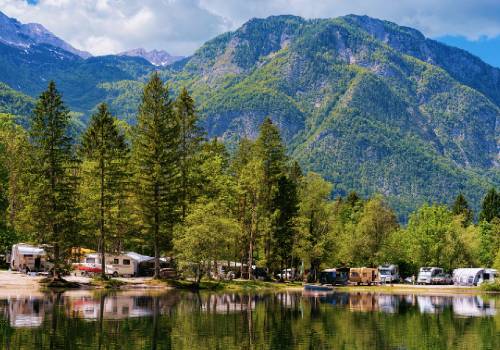
There’s more to a free campsite than saving money on a night’s cheap camping fee, such as these great benefits below.
Stretching Your Travel Budget
When we find a campsite near me that’s free, it immediately opens up other great places to spend our money and improves the whole travel experience.
Saving the cost of one night of a stay at a full hookup RV campground can pay for a family of four to get into a local museum or for a couple to take a guided boat tour down the river.
Most of us are budget-conscious travelers and need to be careful we spend money wisely while on the road. Tenters can also have extra cash for food or activities, as most campgrounds charge around $20 a night to tent camp.
Any time you can camp comfortably for free, it’s wise to take advantage of the opportunity. Most RVers can go 3-7 days in a row at free dry-camping locations without much fuss with a bit of preparation.
Most RVers started as tent campers, so boondock camping isn’t a shock to the system.
Alternate Choice When Campgrounds Are Full
With more people RVing and camping, the availability of private and public campgrounds is shrinking. Often, you need to book a reservation months in advance to secure a site.
For those of us who are full-time RVers or prefer the adventure of winging it during times of travel, you can easily find the campground you thought you’d stay at is full.
Finding a free camping spot at times like this will provide you with a place to park your recreational vehicle or set up a tent and still enjoy your trip.
Fewer People, Less Stress, More Nature
Free camping attracts a specific breed of tenters or RVers who appreciate the ability to not only save money but also get far away from the hustle and bustle of standard RV parks or even public campgrounds at National or state parks.
Learning to function for days on end using your wits and skills builds confidence and a hard-to-explain joy.
Stress levels immediately drop when you don’t have to constantly check phones, listen to the noises of neighbors, whether at home or an RV park or worry your dog is annoying people when it barks.
Many no-cost camping locations drop you into the heart of the wilderness, from beautiful deserts to prairie land to forests and coastlines. These campsites allow you to experience wildlife in a natural setting and help you learn more about the importance of land and water conservation.
7 Best Free Camping Locators
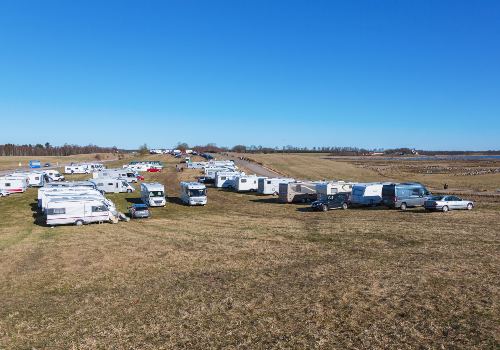
What was once a niche segment of the RVing and tenting community, boondocking, is becoming more popular by the day.
Here are the best sources to find free camping options across the US:
1. Bureau Of Land Management (BLM)
The Bureau of Land Management is a government agency that oversees land that is remote and undeveloped, with the majority of the acreage being in the western part of the US. They do have parcels in other regions.
You can typically camp for free for up to 14-30 consecutive days on BLM land. Cars, vans, and RVs are welcome, but not every location will allow tent camping.
Depending on location, BLM may require you to secure a permit to access the land. Some permits have a fee, and others do not.
Some popular spots have well-defined campsites that are easy to park an RV in because others before you have found level ground. Other places are much more rugged and require careful driving to reach a suitable location to set up camp.
Each BLM site that allows camping, whether dispersed or wild, will have its own feel, so reading reviews from past guests will help you know what to expect.
Some BLM locations have established campgrounds that charge a low nightly rate. These campsites rarely offer any hookups; they’re just in a more convenient location that’s easy to access via RV.
You can download a USFS & BLM Campground App from the App Store to have all the data at your fingertips for both BLM and United States Forest Service camping.
2. Freecampsites.net
Free Campsites is a website that lets us plug in a location, and all the free boondocking near me will pop up. You can also use the road-trip planner to plot out a path of free campsites so you can create an itinerary for an affordable vacation.
The site is user-fed and continually updated with new information on which free campsites are great and which ones you probably should avoid.
Just pull up a map, click on the green (free camping) icon, and get instant information with the exact location, tips on where to park, reviews, and photos. Some sites are RV-friendly truck stops/retail establishments, while others are little-known hidden gems.
3. National Forests & Wildlife Management Areas (WMA)
Outside of established fee-based campgrounds found within national forests or parks, there are many free dispersed campsites for RV or tent camping, as well as offerings from federally-owned wildlife management areas.
These free campsites may be harder to find for newbies, but it becomes easier once you know the system.
Start by visiting the US National Forest website and get links to forests near your desired location. Go to the individual site and look for information on camping, which will tell you if it’s allowed, what type of camping they allow (RV or tent), and other details.
You can find Wildlife Management Areas by U.S. State to see what is available if you’re searching for “primitive camping near me.”
4. Campendium
Want to Connect With a Community of Over 1,078 RV Enthusiasts?
With over 2,800 free campsite listings on Campendium, they are a valuable resource that’s very user-friendly for on-the-go camping enthusiasts. Become a supporter for $29 a year for full access.
Just type in your location under the “find free camping near me” prompt, and all the choices pop up from places that are perfect for RVs or for those that allow tent camping.
Campendium gathers data from campers across the US and inputs it into one convenient website so you can quickly find exactly the campsite type you’re looking for, whether for an overnight rest or a month-long getaway.
The site provides reviews, photos, ratings, dump station locations, and more, so you’ll have a comprehensive view of what free camping is available in your area or along your route.
5. The Dyrt
When you subscribe to the Pro Upgrades at The Dyrt for $35.99 a year, you gain access to free camping listings across the US.
Along with RV locations, you can search for “free tent camping near me” for more detailed information on those campsites.
The Dyrt also provides:
- Nearby fee-based campgrounds
- Reviews and photos
- Trip planning
- Camper resources
- Contests
- Camping forum
6. Army Corp Of Engineers
The Army Corp of Engineers has some lesser-known free camping destinations that will make your trip memorable. In fact, they have over 90,000 campsites available, often near recreational facilities they manage.
You’ll have to do some legwork to pinpoint contact information to get free camping details in your area, but once you know the rules and campsite locations, you can store them away for future use.
Stays are no more than 14 days within a 30-day span, and you’ll need to adhere to the leave-no-trace camping principles.
7. Public Lands App
Download the Public Lands App from the Google Play store to help you find public lands that may offer free campsites near you.
Camping Wrap Up
The more avenues you have to find free campsites quickly, the better off you’ll be when taking an RV or tent camping trip.
We hope the information in this guide widens your camping horizons and shows you how many opportunities there are to save money while traveling.
We hope to cross paths with you soon. Safe travels!
Finding Free and Cheap Camping (Video)
Related Questions
- What are some key benefits of free and cheap camping beyond saving money?
Free and cheap camping offers the opportunity to connect with nature, providing a tranquil and peaceful environment that can help reduce stress and improve mental health.
Additionally, it often leads to more authentic and immersive travel experiences, as it encourages exploration of less touristy areas and fosters a deeper understanding of the local environment and culture.
- How can one ensure safety and security while camping in free or cheap campsites?
To ensure safety and security while camping in free or cheap campsites, one should always research the area beforehand, check for any reported incidents or potential hazards, and choose a well-lit, populated spot to set up camp.
It’s also crucial to secure all food and belongings, maintain a clean campsite to deter wildlife, and have a reliable means of communication in case of emergencies.
- What are some of the best resources or apps to locate free and cheap campsites in the US?
Some of the best resources for locating free and cheap campsites in the US include apps like Campendium, Hipcamp, and The Dyrt, which provide comprehensive databases of campsites along with user reviews and amenities.
Websites like FreeCampsites.net and public lands websites (BLM, National Forest, etc.) are also excellent resources for finding free or low-cost camping options.
- How does the experience of camping in free or cheap campsites differ from camping in established campgrounds?
Free or cheap campsites often offer a more rustic and immersive experience in nature, with fewer amenities and less infrastructure, which can lead to a sense of solitude and adventure.
In contrast, established campgrounds typically provide more amenities such as restrooms, showers, and designated campsites, offering a more comfortable and convenient, but potentially less secluded, camping experience.
- What are some challenges or downsides of free and cheap camping, and how can they be mitigated?
Free and cheap camping often comes with challenges, such as lack of amenities, potential safety issues, and environmental impact.
These can be mitigated by thorough planning and preparation, including researching the campsite, bringing necessary supplies, adhering to safety guidelines, and practicing Leave No Trace principles to minimize environmental impact.
"Man cannot discover new oceans unless he has the courage to lose sight of the shore."
-- Andre Gide

